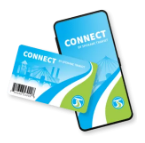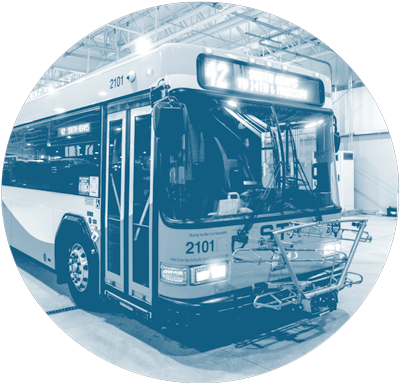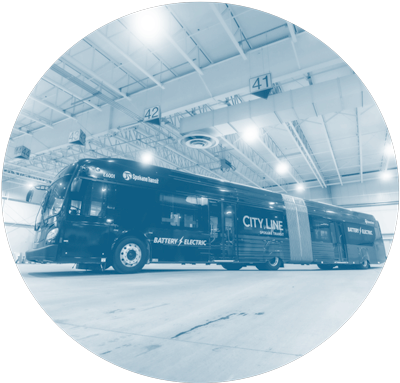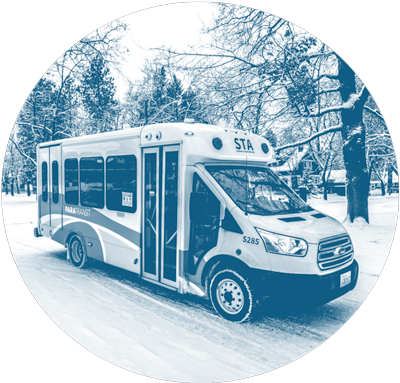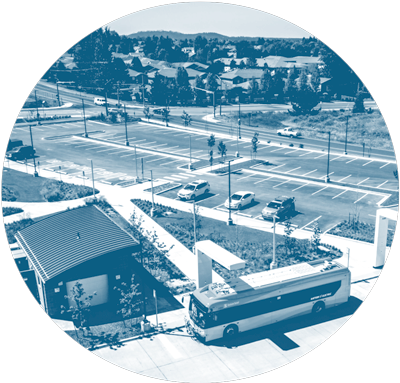Rules Of Conduct
The STA rules of conduct were adopted by the Board of Directors on July 15, 2021, can be downloaded in PDF format by clicking here. You can find the Permit to Engage in Public Communication Activities here.
If you would like a copy sent to you, contact Dana Infalt, Clerk of the Authority, at [email protected] or by calling her at (509) 325-6096.
RULES OF CONDUCT FOR TRANSIT VEHICLES, FACILITIES AND PROPERTIES
ARTICLE I.– INTRODUCTION
Spokane Transit Authority (“STA”) Transit Vehicles, Facilities and Properties are intended to provide Public Transportation Services for the benefit of STA, the General Public, and STA Employees. To maintain Public Transportation Services that are orderly, safe, secure, comfortable and convenient, the following Rules of Conduct for STA Transit Vehicles, Facilities and Properties (the “Rules of Conduct”) have been adopted by the STA Board of Directors. The Rules of Conduct are intended to regulate conduct occurring on STA Transit Vehicles, within or upon STA Facilities and Properties, and in connection with STA’s provision of Public Transportation Services.
The Rules of Conduct consist of five separate articles, which include the following: Article I — Introduction
Article II — Definitions
Article III — Regulation of Conduct
Article IV — Public Communication Activities: STA Transit Vehicles, Facilities and Properties
Article V — Public Communication Activities: The Plaza.
Unless otherwise provided herein, reference to the phrase “Rules of Conduct” shall collectively include Articles I through V.
If any one or more of the provision(s) in the Rules of Conduct shall be declared by any court of competent jurisdiction to be contrary to law, then such provision(s) shall be null and void and shall be deemed separable from the remaining provisions in the Rules of Conduct and shall in no way affect the validity of the other provisions of the Rules of Conduct.
ARTICLE II.– DEFINITIONS
As used in these Rules of Conduct, the words herein shall have the meanings provided in this Article II. Words of the masculine gender shall be deemed and construed to include correlative words of the feminine and neuter genders. Words imparting the singular number shall include the plural numbers and vice-versa, unless the context shall otherwise dictate.
A. “ADA” shall mean The Americans with Disabilities Act.
B. “Bus Shelters” shall mean those structures located in Transit Vehicle loading zones that provide cover for the General Public to board and alight Transit Vehicles.
C. “Commercial Activity or Activities” shall mean any enterprise or venture by groups or individuals for the purpose of promoting or selling products or services to STA Employees or the General Public, whether for profit or not.
D. “Fixed Route or Fixed Route Services” means a system of transporting individuals (other than by aircraft), including the provision of designated Public Transportation Services by public entities and the provision of transportation service by private entities, including, but not limited to, specified Public Transportation Services, on which a vehicle is operated along a prescribed route according to a fixed schedule as defined by 49 CFR §37.1.
E. “General Public” shall mean any Person or group of Persons, including STA Employees not acting in an official capacity at the time.
F. “Kiosk” shall mean the designated kiosk located in the interior of the Street Level and identified in “Appendix 3.”
G. “Lower Level” shall mean the underground level of The Plaza where authorized parking and storage and maintenance areas are available. The Lower Level is not open for access/egress by the General Public.
H. “Park-and-Ride Lots” shall mean locations officially designated by STA at which Persons may park their individual vehicles or bicycles and transfer to an STA Transit Vehicle or car/Rideshare vehicle, or to a vehicle/shuttle permitted by STA. The term shall include all physical improvements and landscaping connected with a Park-and-Ride Lot.
I. “Paratransit or Paratransit Services” means comparable transportation service required by the ADA for individuals with disabilities who are unable to use fixed route transportation systems as defined by 49 CFR §37.3.
J. “Permit” shall mean a permit that gives a Permittee authority to conduct Public Communication Activities in a manner consistent with applicable endorsements, rules and procedures in Articles IV and V herein.
K. “Permittee” shall mean the holder/signatory of a Permit issued in accordance with the rules and procedures in Articles IV and V herein.
L. “Person” shall mean any individual, firm, partnership, corporation, organization, association or entity of any kind.
M. “Public Communication Activity or Activities” shall mean the posting or distributing of flyers, pamphlets, brochures, books or other written material, collecting petition signatures, political campaigning, demonstrating, displaying signs, picketing, unscheduled playing of musical instruments or other performances, public speaking, conducting surveys, soliciting or receiving of funds or contributions of any kind for any purpose, or otherwise communicating or attempting to communicate to the General Public.
N. “Public Transportation Services” shall include the definition of Public Transportation Services in RCW 36.57A.010(8), together with Rideshare and Fixed Route and Paratransit services, whether operated by STA or any governmental agency, private Person, firm or corporation contracting with STA pursuant to chapter 36.57A. RCW.
O. “Rules of Conduct” shall mean the Rules of Conduct adopted by the Board of STA on May 24, 1995, and amended on November 27,1996, December 17,1997, July 24, 2002, February 25, 2004, April 19, 2007, October 15, 2009, March 17, 2010, June 21 2012, and ,
2017,which regulate conduct occurring on STA Transit Vehicles, within or upon STA Facilities and Properties, and in connection with STA’s provision of Public Transportation Services. Unless otherwise provided herein, such definition shall include, collectively, Articles I through V.
P. “Sidewalk Space A” shall mean the exterior area of The Plaza located on the Street Level at the southeast corner of The Plaza at Sprague Avenue and Wall Street shaded and identified in “Appendix 3”.
Q. “Sidewalk Space B” shall mean the exterior area of The Plaza located on the Street Level at the northeast corner of The Plaza at Riverside Avenue and Wall Street shaded and identified in “Appendix 3”.
R. “Skywalk Level” shall mean the entire second floor of The Plaza, including any and all skywalk bridges connecting The Plaza to adjoining buildings. The Skywalk Level is used for STA operational functions, authorized events and for ingress and egress of the General Public through the skywalks located on the North and East sides of the Skywalk Level. “STA” shall mean Spokane Transit Authority, a Washington municipal corporation and Public Transportation Benefit Area (“PTBA”) organized and operating under and by virtue of the laws of the State of Washington.
S. “STA Employee” shall mean any part-time or full-time, temporary or regular, exempt or non-exempt, represented or non-represented Person, including an intern or contracted party, who is compensated by STA for services by wages, salary, or other remuneration.
T. “STA Facilities and Properties” shall mean all facilities, structures, schedule and news racks, kiosks, fare vending machines, cameras and camera components, bulletin and information boards, bus stops, bus stop signs, lands, interest in lands, air rights over lands, and rights of way of all kinds that are owned, leased, held, or used by STA for the purpose of providing Public Transportation Services, including, but not limited to, Park-and-Ride Lots, Transit Centers, bus shelters, public streets and sidewalks that are used by the General Public to board and alight Transit Vehicles.
U. “Street Level” shall mean the interior first floor of The Plaza and adjacent exterior zones where the General Public boards and alights Transit Vehicles. The interior Street Level is open for General Public access/egress only when The Plaza services are operating or for authorized post-service period events.
V. “The Plaza” shall mean the downtown Transit Center located at 701 West. Riverside Avenue, Spokane, WA consisting of the Lower Level, Street Level and Skywalk Level, as such levels are defined herein.
W. “Transit Centers” shall mean locations where bus routes have a common terminus and facilities are provided to facilitate General Public boarding and alighting of Transit Vehicles,
including all physical improvements and landscaping, except that such definition shall not include The Plaza.
X. “Transit-related Activities” shall mean activities associated with the provision or support of STA Public Transportation Services, the use of those services by the General Public, and STA sales, promotion and maintenance activities in support of STA Public Transportation Services.
Y. “Transit Vehicle” shall mean a municipal Transit Vehicle defined in RCW 46.04.355.
Z. “Rideshare or Rideshare Services” shall mean a voluntary commuter ridesharing arrangement, using vans with a seating capacity greater than 7 Persons (including the driver) or buses, which provides transportation to a group of individuals traveling to and from their homes to their regular places of work within the same geographical area, and in which the commuter/driver does not receive compensation beyond reimbursement for his or her costs of providing the service as defined by 49 CFR §37.3.
ARTICLE III.– REGULATION OF CONDUCT
A. PROHIBITED CONDUCT
The following conduct is prohibited on STA Transit Vehicles, within or upon STA Facilities and Properties, and in connection with STA’s provision of Public Transportation Services:
1. Engaging in any conduct prohibited by RCW 9.91.025 or Spokane Municipal Code (SMC) 10.10.100;
2. Use of chewing tobacco except at a designated place; use of any nicotine or smoking device which causes any smoke, mist, vapor or the like to be emitted through its use, within twenty-five (25) feet of any STA Transit Vehicle, shelter, or other public transportation facility, or within twenty-five (25) feet of any entrance, window, or air intake opening of STA buildings; smoking or carrying a lighted or smoldering pipe, cigar, or cigarette within twenty- five (25) feet of any STA Transit Vehicle, shelter or other public transportation facility, or within twenty-five (25) feet of any entrance, window, or air intake opening of STA buildings (RCW 9.91.025, RCW 70.160.020(1)(2) and RCW 70.160.030);
3. Discarding litter other than in designated receptacles (RCW 9.91.025/SMC 10.10.100);
4. Dumping or discarding, or both, any materials on transit property, including but not limited to hazardous substances and automotive fluids (RCW 9.91.025);
5. Playing any radio, recorder, or other sound-producing equipment, except that nothing herein shall prohibit the use of such equipment when connected to earphones or an ear receiver that limits the sound to individual listeners or the use of communication devices by STA Employees, STA contractors or public safety officers in the line of duty, or the use of private
communication devices used to summon, notify, or communicate with other individuals (e.g., pagers, beepers or cellular telephones) (RCW 9.91.025);
6. Spitting, expectorating, urinating, or defecating, except in the appropriate plumbing fixtures in restroom facilities (RCW 9.91.025/SMC 10.10.100);
7. Carrying or having on their Person any flammable liquid, explosive, acid, or other article or material likely to cause harm to others except that nothing herein shall prevent a Person from carrying a cigarette, cigar, or pipe lighter or carrying a firearm or ammunition in a way that is not otherwise prohibited by law (RCW 9.91.025/SMC 10.10.100);
8. Obstructing or impeding the flow of STA Transit Vehicles or passenger movement, hindering or preventing access to STA Transit Vehicles or property, including causing unreasonable delays in boarding or alighting, blocking or partially blocking an aisle or stairway with a package or object, reclining in more than one seat, or in any way interfering with or seriously disrupting the provision or use of transit services (RCW 9.91.025/SMC 10.10.100/ADA);
9. Disturbing others by engaging in loud, raucous, unruly, aggressive, violent, harmful, or harassing behavior (RCW 9.91.025/SMC 10.10.100/ADA);
10. Destroying, defacing, or otherwise damaging STA property or any signs, notices, or advertisements on transit property (RCW 9.91.025/SMC 10.10.100);
11. Consuming an alcoholic beverage, or in possession of an open beverage container holding alcohol in any Transit Vehicle. Carrying any alcoholic beverage or controlled substance in any Transit Vehicle, unless otherwise authorized by law (RCW 46.61.519);
12. Consuming an alcoholic beverage, or in possession of an open container of alcohol on STA Facilities and Properties, except where permitted to do so by virtue of possession of a valid state and/or local liquor license and authorized by STA (RCW 9.91.025);
13. Consuming, opening, having an open package containing marijuana, useable marijuana, marijuana-infused products, or marijuana concentrates on STA Facilities and Properties or in Transit Vehicles; including possessing marijuana or marijuana products in Transit Vehicles except in a package, container or receptacle that has not been opened or the seal broken or contents partially removed. (RCW 46.61.745/RCW 69.50.445/SMC 10.15.220)
14. Carrying, exhibiting, displaying, or drawing any firearm, dagger, sword, knife or other cutting or stabbing instrument, club, or any other weapon apparently capable of producing bodily harm, in a manner, under circumstances, and at a time and place that either manifests an intent to intimidate another or that warrants alarm for the safety of other Persons, unless otherwise authorized by law (RCW 9.41.270);
15. Throwing an object at Transit Vehicles or STA Facilities and Properties, or at any Person on STA Facilities and Properties or using a Transit Vehicle (RCW 9.91.025);
16. Allowing any animal, including service animals, to occupy a seat on Transit Vehicles or STA Facilities and Properties, to run at large, to unreasonably disturb others, leave waste matter on STA Facilities and Properties, or interfere with Transit-Related Activities. Except for service animals, animals are not allowed in STA Facilities and Properties or Transit Vehicles unless the animal is in a carrier designed specifically for animals, with absorbent material on the carrier floor;
17. Roller-skating, rollerblading or skateboarding on STA Facilities and Properties (RCW 9.91.025/SMC 16.61.787);
18. Riding bicycles, unicycles, mopeds and motorcycles, except where vehicle travel and access is permitted (SMC 16.61.787);
19. Using STA Facilities and Properties for residential or commercial parking purposes except as authorized by STA or its designee;
20. Operating, stopping, standing or parking a vehicle in any roadway or location restricted for use only by Transit Vehicles or otherwise restricted;
21. Eating on Transit Vehicles or in prohibited areas of STA Facilities and Properties; STA permits transportation and consumption of beverages on Transit Vehicles when the beverage is in, a container with a lid.
22. Using a public address system, loudspeaker or other sound amplifying device, except as authorized by STA or its designee (RCW 9.91.025);
23. Sitting or lying on floors of Transit Vehicles, planters, handrails, stairs, counters, window sills, or any other area or fixture not specifically designed for seating purposes, or floors, sidewalks, asphalt, or other ground covering in or on STA Facilities and Properties;
24. Sleeping, camping or storing personal property on benches and floors on or within Transit Vehicles or STA Facilities and Properties, unless otherwise authorized by law;
25. Entering or remaining upon any nonpublic areas of STA Facilities and Properties, including, but not limited to, staging areas, work areas and equipment rooms, except when authorized by STA or its designee;
26. Entering or remaining in an area marked as reserved for senior citizens or Paratransit customers without proof of age or a ride booked on Paratransit;
27. Entering Transit Vehicles or STA Facilities and Properties without wearing a shirt and shoes or failing to maintain a level of personal hygiene that is not offensive to other customers;
28. Engaging in commercial activities on STA Facilities or Properties or Transit Vehicles, except as such activities are authorized by STA or its designee in a written Permit, license, concession contract, lease or other written authorization;
29. Engaging in Public Communication Activities on STA Facilities or Properties or Transit Vehicles, except as such activities are authorized by Articles IV and V herein;
30. Engaging in any civic, cultural and other special event not included in the definitions of commercial or Public Communication Activities in Article II herein, except as such activities are authorized by STA or its designee in a written Permit, license, concession contract, lease or other written authorization;
31. Committing any act which tends to create or incite, or creates or incites, an immediate breach of the peace, including, but not limited to (a) fighting, (b) racing, (c) obscene language or conduct tending to cause a breach of the peace, and (d) personally abusive epithets, or words or language of an offensive, disgusting or insulting nature, which epithets, words or language when addressed to the ordinary citizen are, as a matter of common knowledge, inherently likely to provoke a violent reaction of fear, anger or apprehension;
32. Engaging in sexual activity with self or others while accessing or riding a Transit Vehicle; or on STA Facilities or Properties;
33. Engaging in gambling or any game of chance for the winning of money or anything of value on STA Transit Vehicles or on STA Facilities or Properties (RCW 9.91.025);
34. Use of Transit Vehicles or STA Facilities and Properties for non Transit-Related Activities, except as authorized by STA (RCW 9.91.025);
35. Use of electric charging stations [or outlets] located in The Plaza for periods in excess of thirty (30) minutes per day or blocking access to electric charging stations [or outlets];
36. Entering Transit Vehicles or STA Facilities and Properties when lacking the ability, because of illness, intoxication, or medication(s), to care for one’s self;
37. Extending an object or a portion of one’s body through the door or window of a Transit Vehicle;
38. Hanging or swinging on bars or stanchions, with feet off the floor, inside a Transit Vehicle or other STA Facilities and Properties; hanging onto or otherwise attaching oneself at any time to the exterior of a Transit Vehicle or other STA Facilities and Properties;
39. Engaging in any physical sport activity on STA Facilities and Properties;
40. Failing to pay the appropriate fare as required by STA, including failure to display proof of payment when requested to do so by a Person designated to monitor fare payment or failure to depart the bus or other mode of public transportation when requested to do so by a Person designated to monitor fare payment (RCW 36.57A.230/RCW 9.91.025);
41. Falsely representing oneself as eligible for a special or reduced fare or using any Permit or pass related to a Transit Vehicle by making a false representation of eligibility (RCW 9.91.025);
42. Falsely claiming to be a transit operator, other transit employee, or volunteer; or through words, actions and/or the use of clothes, insignia or equipment resembling department-
issued uniforms and equipment, creating a false impression that he or she is a transit operator, other transit employee, or volunteer (RCW 9.91.025);
43. Refusing to allow proper securement of a wheelchair on Transit Vehicles;
44. Interfering or tampering with mobile data computers, camera components; fare boxes, or any other equipment on Transit Vehicles or STA Facilities and Properties (RCW 9.91.025);
45. Exceeding the number of no shows allowed under the Paratransit procedures for shared-ride service, provided that trips missed for reasons beyond the customer’s control shall not be counted as no shows;
46. Impeding Paratransit Services through non-compliance with the procedures set forth in the Paratransit Rider’s Handbook;
47. Violating an exclusion order issued pursuant to B.2 of Article III herein; (RCW 9A.52.070/080);
48. Engaging in other conduct that is inconsistent with the intended use and purpose of Transit Vehicles or STA Facilities or Properties and refusing to obey the lawful commands of an agent of the transit authority or a peace officer to cease such conduct (RCW 9.91.025);
49. Making hostile, harassing, threatening or nuisance statements to STA Employees, including but not limited to telephone calls placed to 509-328-RIDE(7433) or STA’s administrative, Paratransit or operational system telephone numbers; and
50. Violating any federal, state, or municipal civil and criminal laws.
B. ENFORCEMENT
1. Removal and/or Exclusion from STA Transit Vehicles, Facilities and Properties.
Any Person engaging in prohibited conduct under the provisions of Article III may be refused entrance upon or ordered to leave STA Transit Vehicles, Facilities and Properties by a commissioned law enforcement official, STA personnel as authorized by the Chief Executive Officer of STA, or authorized personnel of a contracted service provider in accordance with the terms of the applicable service contract. Failure to immediately comply with such a removal order may be grounds for prosecution for criminal trespass and/or unlawful transit conduct.
2. Procedure for Administrative Exclusion.
Except as provided in STA’s Code of Conduct (Article III, Section B (2)(d) – Immediate Refusal or Removal), STA Employees shall not refuse service to anyone who has not been formally excluded from STA service pursuant to the application of STA’s Rules of Conduct or a court order.
(a) Basis for Exclusion. Engaging in prohibited conduct under Article III shall be cause for excluding a Person from the privilege of entering and using all or any part of Transit Vehicles, or STA Facilities and Properties for a period of time as determined by STA based on the conduct and circumstances leading to an exclusion.
(b) Notice Procedure. The STA Chief Executive Officer, or his/her designee, shall give written notice by personal delivery or by mailing a copy by regular U.S. Mail addressed to the Person’s last known address, to any Person to be excluded from Transit Vehicles, or STA Facilities and Properties. The notice shall specify the reason for exclusion, places and duration of the exclusion, the effective date of the exclusion, the appeal process, and provide the Person an opportunity to respond in person, by telephone or in writing, to the proposed action within five (5) calendar days of actual or constructive receipt of the notice by the Person being excluded.
An exclusion shall commence on the sixth calendar day after actual or constructive receipt of the notice by the Person being excluded, unless the Person has timely requested an administrative review of the notice, in which case the STA Chief Executive Officer, or his/her designee, shall review the exclusion and shall render a written decision determining whether exclusion is warranted within five (5) calendar days from the date of the Person’s request for review. Such written decision shall be delivered personally to the requesting Person or delivered by mailing a copy by regular U.S. Mail, addressed to the Person’s last known address.
If the STA Chief Executive Officer, or his/her designee, determines that exclusion is warranted, such exclusion shall commence and be effective upon actual or constructive receipt of the written decision by the Person to be excluded.
(c) Constructive Notice. Receipt of a notice is construed to have been accomplished if the Person knew or reasonably should have known from the circumstances that he/she is excluded from Transit Vehicles, Facilities and Properties. Receipt of a notice is also presumed to have been accomplished three (3) calendar days after the notice has been placed in the U.S. Mail.
(d) Immediate Refusal or Removal. The notice procedure described in Article III, Section B 2(b), (c) above may be waived, if, in STA’s discretion, immediate conditions exist that pose safety or security risks, interfere with or impinge on the rights of others, impede the free flow of the General Public, impede the orderly and efficient use of Transit Vehicles or STA Facilities and Properties, or otherwise interfere with or seriously disrupt STA’s transit related activities. In such immediate conditions, Persons engaging in prohibited conduct under the provisions of Article III may be immediately reseated, refused transportation, or removed from Transit Vehicles or STA Facilities and Properties. The notice and administrative review provisions of Article III, Section B 2(b) shall not be available to a Person immediately refused transportation or removed from Transit Vehicles or STA Facilities and Properties for any period less than thirty (30) calendar days.
(e) Refusal to Comply. The refusal to immediately comply with an order excluding a Person from Transit Vehicles or STA Facilities and Properties shall be grounds for prosecution for criminal trespass.
(f) Length of Exclusion. The following suggested exclusion lengths are guidelines to be used by STA in determining the duration of a particular exclusion under the provisions of Article III. The actual exclusion period imposed may be shorter or longer depending on the circumstances of each case, and the circumstances that form the basis for determining the length of exclusion shall be stated in STA’s written report(s) of the incident(s) leading to exclusion. Circumstances considered by STA in determining the length of exclusion may include, without limitation, the immediate incident, STA’s documented history of prior incidents involving the excluded Person, STA security records, supervisor records and any other public records available to STA regarding the individual’s conduct while using or accessing Transit Vehicles or STA Facilities and Properties.
First Offense: 1-90 days
Second Offense: 91-180 days
Third Offense: 181-364 days
Each Subsequent Offense: 365 or more days
(g) Appeal Procedure. The following appeal process shall be provided to any person excluded from Transit Vehicles or STA Facilities and Properties for a period of thirty (30) days or more. Not later than ten (10) calendar days after commencement of the exclusion, an excluded Person may appeal in writing to the STA Director of Communications and Customer Service, or his/her designee, for de novo review of the exclusion. Commencement of the exclusion shall be defined as the date upon which the exclusion became effective and shall be determined by STA’s official records. The appellant may request a hearing or may request review without a hearing based on a written statement setting forth the reasons why the exclusion is invalid or improper. If the excluded Person is unable to respond in written format, STA will make reasonable accommodation to allow due process. If no hearing is requested, the STA Director of Communications and Customer Service, or his/her designee, shall render a written decision within twenty (20) calendar days after receipt of the appeal.
(h) Hearing. If a hearing is requested, the hearing shall be held within twenty (20) calendar days after receipt of the appeal, and a written decision shall be rendered within twenty (20) calendar days after the hearing. Exclusions shall not be stayed during the appeal process, unless the exclusion is for missing scheduled trips under Article III, Section A, 26 herein. If an appellant requires Public Transportation Services to attend the hearing, the appellant shall contact the STA Director of Communications and Customer Service, or his/her designee, five (5) business days prior to the hearing date, and STA shall make arrangements to provide the necessary Public Transportation Services for the appellant.
3. Other Laws not Limited.
The enforcement of Article III herein is not intended to limit, in any manner, the enforcement of any applicable federal, state or municipal laws, provided STA is not authorized to assist a patron or employee in enforcing a court order prohibiting or restricting contact with any other Person other than to notify appropriate law enforcement personnel via STA’s dispatcher or STA Security.
C. LIABILITY
Nothing in Article III herein shall create a duty to any Person on the part of STA or form any basis for liability on the part of STA, its officers, agents or employees. The obligation to comply with Article III is solely that of any Person entering and using Transit Vehicles or STA Facilities and Properties and STA’s enforcement of Article III is discretionary, not mandatory.
ARTICLE IV.– PUBLIC COMMUNICATION ACTIVITIES AT STA TRANSIT VEHICLES, FACILITIES AND PROPERTIES OTHER THAN THE PLAZA
A. PURPOSE AND SCOPE
1. Non-Open Public Forums.
As a provider of Public Transportation Services, STA makes a variety of Transit Vehicles and certain STA Facilities and Properties available to Persons who use such Public Transportation Services. Although these Transit Vehicles and STA Facilities and Properties may be accessed by the General Public, they are not open public forums either by nature or by designation. They are intended to be used solely for Transit-related Activities and provide little, if any, space for other non Transit-Related Activities.
2. STA’s Legitimate Interests.
Most Public Communication Activities are prohibited on Transit Vehicles and within or upon STA Facilities and Properties, regardless of viewpoint expressed, because they are incompatible with STA’s legitimate interests, including but not limited to:
(a) securing the use of scarce parking spaces and shelter space for Persons who are using Public Transportation Services;
(b) maintaining safe, clean and secure Transit Vehicles and STA Facilities and Properties to retain existing, and attract new users of Public Transportation Services;
(c) reducing litter pick-up and other maintenance or administrative expenses so as to maximize the provision of Public Transportation Services; and
(d) preventing delays and inconvenience to the General Public by minimizing congestion, and expediting the boarding, transferring, and alighting of Transit Vehicles.
3. Purpose of Article IV.
STA’s intent and desire is to allow members of the General Public to engage in Public Communication Activities on Transit Vehicles and within or upon STA Facilities and Properties to the extent such activities are compatible with STA’s legitimate proprietary functions and interests, but expressly does not hereby designate its Transit Vehicles or STA Facilities and Properties as public forums. It is the purpose of Article IV to describe the limited extent to which the General Public is allowed to engage in Public Communication Activities on Transit Vehicles and within or upon STA Facilities and Properties. Article IV does not apply to STA Employees engaged in authorized activities in the course of their employment or to events or commercial activities previously authorized by STA. Article IV does not apply to commercial advertising on or upon STA Facilities and Properties or Transit Vehicles.
4. Facilities Governed by Article IV.
STA Transit Vehicles and STA Facilities and Properties, except The Plaza, are governed by Article IV. The Plaza is governed by Article V.
B. REGULATION OF PUBLIC COMMUNICATION ACTIVITIES
Persons engaging in Public Communication Activities at STA Facilities and Properties governed by Article IV involving signs, boxes, receptacles, easels, tables or other similar apparatus of any kind, must first obtain an STA Permit in accordance with the rules and procedures set forth in Article IV. Otherwise, no Permit will be required for Public Communication Activities at STA Facilities and Properties governed by Article IV.
STA personnel may require that any Public Communication Activity at STA Facilities and Properties governed by Article IV not be conducted within ten feet of Persons in Transit Vehicle queue lines, loading zones, bus entrances or exits, or permanent waiting fixtures, unless invited closer by a transit patron.
1. Limitations.
Public Communication Activities which are otherwise lawful are permitted on STA Transit Vehicles and within or upon STA Facilities and Properties governed by Article IV, subject to the following exceptions and limitations:
(a) Unless otherwise authorized by STA posting or affixing flyers, pamphlets, brochures, leaflets, written or graphic material of any kind is prohibited.
(b) Selling or offering for sale or donation books, pamphlets, or any other written or printed material is prohibited.
(c) Soliciting funds is prohibited, provided that solicitation for donations for non-profit causes may be conducted under Article V within designated areas of The Plaza, and are otherwise subject to the Rules of Conduct and laws applicable to such fundraising.
(d) Signs, banners, structures or other paraphernalia may not be affixed to or erected on STA Transit Vehicles and within or upon STA Facilities and Properties, except as authorized by STA or law.
(e) Signs carried by or on a Person are not permitted in Transit Vehicles. Signs carried by or on a Person are permitted within or upon other Article IV STA Facilities and Properties provided the signs are not constructed of a size or material which could inadvertently or intentionally cause injury to a Person or property, except signs are not permitted on STA Transit Vehicles. Signs may not be of a size that obstructs the free flow of the General Public and may not exceed 32 inches by 32 inches. A “sandwich board” sign may not extend beyond the carrier’s shoulders or, if used by a Permittee, beyond the permitted area.
(f) Public Communication Activities will not be permitted in parking areas, Park-and Ride Lots, or roadways. Public communication activities may not block any loading zone, signage, stairway, escalator, elevator, customer service counter, ticket or automatic teller machine, authorized commercial activity, any fire safety system component, telephone, information board or the normal General Public paths to and from such areas.
(g) Public communication activities otherwise permitted under Article IV are prohibited if the number of Persons engaged in the activities, their location or their manner of conducting the activities is found to create safety or security problems, interfere with the free flow of Persons onto or off of STA Transit Vehicles, or into, within or from STA Facilities and Properties; interfere with, or seriously disrupt the operation of such Transit Vehicles, Facilities and Properties, or STA’s provision of Public Transportation Services.
(h) Persons engaged in Public Communication Activities within or upon Article IV STA Facilities and Properties shall not use any parking spaces provided at such Facilities and Properties unless they are also using STA’s Public Transportation Services.
(i) Hold Harmless. Any Permittee, including Permittee’s personal representatives, successors in interest, and assigns, shall, as a precondition to the issuance of the Permit, agree to indemnify, defend and hold harmless STA, and its officers, agents and employees from all suits, claims, actions and damages of whatsoever kind or nature arising out of or resulting from the Permittee’s use of STA Facilities and Properties except to the extent caused by the negligence of STA and its officers, agents and employees. Permittee shall further covenant and agree to specifically assume potential liability for actions brought by Permittee’s own employees against STA and its officers, agents and employees and, for that purpose only, Permittee specifically waives any immunity under the Workers’ Compensation Act, Title 51 RCW; provided, however, that said waiver shall not apply to such actions in which Permittee’s employee alleges that the claim arises through the fault of STA and its officers, agents and employees and through no fault of Permittee, unless the fault of Permittee is established through discovery or at trial.
C. GENERAL
1. Liability for Clean-up.
Any Person engaged in Public Communication Activities and found responsible for litter, damages or destruction of STA Transit Vehicles and within or around STA Facilities and Properties, whether by accident or intent, shall be responsible for the clean-up and/or liable for the cost of repairing or replacing the property.
2. Liability of STA.
Nothing in Article IV or in the permitting of Public Communication Activities on STA Transit Vehicles and within or upon STA Facilities and Properties shall create a duty to any Person on the part of STA or form any basis for liability on the part of STA, the members of the Board, its agents or employees. The obligation to comply with the requirements of Article IV is solely that of any Persons engaging in Public Communication Activities and STA’s enforcement of Article IV is discretionary, not mandatory.
3. Non-STA Uses.
Notwithstanding the limitations and prohibitions contained in Article IV, STA reserves the right to enter into leases or other use agreements permitting non-STA uses of STA Transit Vehicles and STA Facilities and Properties that are found to be compatible with STA’s proprietary functions and interests.
ARTICLE V.– PUBLIC COMMUNICATION ACTIVITIES: THE PLAZA
A. INTRODUCTION
1. Purpose of The Plaza.
The Plaza is first and foremost intended for STA Public Transportation Services and the use of those services by the General Public. Safe and efficient movement of STA Transit Vehicles and customers within and upon The Plaza is paramount to achieving safety, security, maintenance and operation objectives and meeting General Public expectations concerning The Plaza and STA’s provision of Public Transportation Services. Selected areas of The Plaza may accommodate Public Communication Activities unrelated to the provision of Public Transportation Services at the discretion of STA. To the extent Public Communication Activities can be accommodated at The Plaza, the rules and procedures stated in this Article V shall apply.
2. Purpose of Article V.
The Plaza is primarily intended for Persons making use of Public Transportation Services, although areas of The Plaza are also open to the General Public and patrons of the commercial establishments located on the Street Level of The Plaza.
The public areas of The Plaza consist of the Street Level and designated areas of the Skywalk Level as further identified on “Appendix 3.” With respect to these public areas, STA
is, within reasonable limits, authorized to regulate the time, place, and manner in which Persons conduct themselves.
Without regard to content, individuals or groups involved, some activities might be denied altogether or made subject to the Rules of Conduct. Such activities would include, but are not necessarily limited to, those that are inconsistent with the intended purpose of a given area, pose safety or security risks, interfere with or impinge on the rights of others, impede the free flow of the General Public, affect the orderly and efficient use of The Plaza, or otherwise interfere with STA’s Public Transportation Services, operations and maintenance activities.
Accordingly, the express purpose of Article V is to accommodate freedom of expression and maintain the operational function of The Plaza as a Transit Center. Article V should be construed and interpreted to achieve that end.
B. RULES AND PROCEDURES
1. STA Intent.
It is the intent of STA to accommodate, to the extent practicable, Public Communication Activities that are not associated with the purposes for which The Plaza was intended. While attempting to accommodate such activities, STA must extend some control over them to achieve the goals and objectives described above. Accordingly, Persons will be allowed to engage in Public Communication Activities in designated areas located on the Sidewalk Level of The Plaza, provided such activities are conducted in accordance with the following rules and procedures, as applicable, and are not in violation of the Rules of Conduct and existing laws. No Public Communication Activities are permitted on the Lower Level or Skywalk Level.
2. Public Communication Activities & Permits
No Permit is required for Persons engaging in Public Communication Activities in the Transit Vehicle loading zone/sidewalks surrounding the Street Level of The Plaza unless the Public Communication Activities involve the use of signs, boxes, receptacles, easels or other similar apparatus of any kind. STA personnel may require that such activity not be conducted within ten feet of Persons in sidewalk queue lines, bus exits or permanent waiting fixtures unless invited closer by a transit patron.
All other Public Communication Activities at The Plaza require a Permit from STA, including all Transit Vehicle loading zone/sidewalk activity involving the use of signs, boxes, receptacles, easels or other similar apparatus of any kind. Permits will only be issued for use of the Kiosk, Sidewalk Space A or Sidewalk Space B. No other Public Communication Activities are permitted at The Plaza.
Persons engaging in Public Communications Activities at the Kiosk, Sidewalk Space A or Sidewalk Space B must first obtain a Permit from STA in accordance with the rules and procedures set forth in Article V. The locations of the Kiosk, Sidewalk Space A and Sidewalk Space B are the shaded areas identified on “Appendix 3” attached hereto and by this reference incorporated herein.
(1) A Permit may be renewed prior to its expiration for up to seven (7) additional calendar days by filing with STA’s Director of Communications and Customer Service or his/her designee, a notice that the Permittee intends to continue his/her activity, together with any amendments necessary to keep the information required by the Application current and accurate. A Permit shall not be renewed if the notice and information herein required are not timely filed or if the continued presence of the Permittee cannot be accommodated under the rules and procedures in this Article V.
(2) Permittees will be required to have the Permit on their person (or with group) when engaged in their activity. A copy of the form of the Permit is attached hereto as “Appendix 2” and by this reference is incorporated herein.
(c) Areas of Permit Exercise. Permitted Public Communication Activities, as defined in Article II herein, are permitted only at (1) the Kiosk and/or (2) Sidewalk Space A and/or (3) Sidewalk Space B on the Street Level as indicated on the Permit and as defined in Appendix 3. Use of such space is limited to the area designated on the Permit only.
(b) Denial of Permit. If a Permit is denied, STA’s Director of Communications and Customer Service or his/her designee shall serve on the applicant personally or by regular U.S. Mail, return receipt requested, a written statement of reasons for denial. A Permit shall not be denied unless:
(1) The applicant has not furnished the information required by the Application, or has failed to agree to the conditions of the Permit;
(2) The applicant is subject to: (i) an exclusion order issued to the applicant or participant pursuant to Article III herein; (ii) a revocation of a previous Permit issued to the applicant; or (iii) a failure to comply with the terms and conditions of a Permit previously issued to the applicant;
(3) The nature of the activity that the applicant wishes to conduct constitutes a Commercial Activity as defined in Article III herein and is subject to other requirements of STA;
(4) Emergency conditions exist that make the applicant’s proposed activity at the date, time and location proposed by the applicant incompatible with the operational function of The Plaza; or
(5) More applicants than herein provided for have requested permitted activities for the same date, time and location and the applicant is not entitled to priority in accordance with the rules and procedures in this Article V.
(6) Where feasible, the Director of Communications and Customer Service or his/her designee may propose measures for curing any defect in the application for a Permit.
(c) Revocation of Permit. A Permit shall be revoked immediately by STA’s Director of Communications and Customer Service or his/her designee when evidence exists that:
(1) A Permittee has violated the provisions of the Rules of Conduct, has been duly warned of the violation at least once, but has not complied; or
(2) The activity has attracted a crowd of sufficient size so as to begin to adversely impact the safety, security or rights of others, the free flow of the General Public, or the normal operation requirements of The Plaza. Under this circumstance, the Permit may be returned for use if the crowd disperses and the adverse conditions that existed at the time of revocation are no longer present.
(d) Notice of Revocation.
(1) Notice of revocation shall be in writing supported by a statement of facts and a list of witnesses to the facts stated, and the notice shall be personally served upon the Permittee or mailed to the Permittee by certified mail, return receipt requested. A notice of revocation need not be in writing, if immediate conditions exist that pose safety or security risks, interfere with or impinge on the rights of others, impede the free flow of the General Public, affect the orderly and efficient use of The Plaza, or otherwise interfere with STA’s Public Transportation Services, operations and maintenance activities. If written notice of revocation is not given because of such immediate conditions, the STA Director of Communications and Customer Service or his/her designee shall within one (1) calendar day from the date of revocation, prepare a written notice of revocation as required above.
(2) Once a Permit has been revoked, a Person shall not continue their activity until another Permit has been obtained or the revoked Permit returned by the STA Director of Communications and Customer Service or his/her designee. If the Permit has been revoked on a permanent basis, all materials involved in the terminated activity must be removed immediately, by the individual(s) involved.
(e) Appeal from Denial or Revocation.
(1) Upon notification of the denial of a Permit, or revocation thereof, an applicant or Permittee may file a notice of appeal with STA’s Chief Executive Officer or his/her designee.
(2) Upon receipt of the notice of appeal, the matter shall be set for a hearing before STA’s Chief Executive Officer or his/her designee within ten (10) calendar days and STA shall issue a notice of hearing which shall be sent by certified mail, return receipt requested, to the applicant or Permittee, and which shall contain the date, time and place of the hearing.
(3) At the hearing, the applicant or Permittee may be represented by legal counsel. Testimony shall be taken upon oath or affirmation first of witnesses in support of the denial or revocation of the Permit. The applicant or Permittee may testify and present witnesses on his behalf. A record shall be made of the proceeding and kept on file with STA.
(4) The findings and order of STA’s Chief Executive Officer or his/her designee shall, within seven (7) calendar days of the conclusion of the hearing, be sent to the applicant or Permittee by certified mail, return receipt requested.
(5) An applicant denied a Permit may immediately appeal the order of STA’s Chief Executive Officer to any court with jurisdiction. Filing an appeal stays the order of STA’s Chief Executive Officer until a final judicial decision has been rendered. A denied applicant who desires to file an appeal shall have seven (7) calendar days from the date the applicant receives the order to file such appeal before the order becomes final.
(f) Availability of and Limit Upon Permits.
(1) Permits will be issued on a first-come, first-served basis, subject to availability. If more Persons are requesting issuance of Permits than can be accommodated for the area, date and time requested, STA’s Director of Communications and Customer Service or his/her designee shall give preference to the applicant or applicants who have had the least opportunity during the preceding thirty (30) calendar days to conduct Public Communication Activities. Permits shall be issued without regard to the identity of the Person or cause for which the Permit is being requested.
(2) For safety and security reasons, to ensure the free flow of the General Public and the intended transportation functions of The Plaza are met, and to accommodate other activities competing for the limited available space, a maximum of four (4) individuals, representing the same groups or causes, will be allowed to engage in Public Communication Activities at the area designated in the Permit at any given time.
(g) Use of the Kiosk. A Permit issued to engage in Public Communications Activities at the Kiosk is subject to the following conditions.
(1) The Kiosk must be attended at all times, unless the Permittee is physically present within the area and can maintain sight of the Kiosk at all times.
(2) The Kiosk may be used to distribute and display material in conjunction with the Public Communication Activity. No materials may be stored on top of or underneath the Kiosk unless authorized by STA.
(3) Under no circumstances may Person(s) staffing the Kiosk obstruct the free flow of Persons moving within or through The Plaza.
(4) Signs, leaflets or other materials may only be affixed to the Kiosk in a manner acceptable to STA. No signs, leaflets or other materials may be posted to or erected within The Plaza.
(5) STA will not be held responsible for damage to or loss of any materials furnished by Permittee.
(k) Transferability. Upon written approval by STA’s Director of Communications and Customer Service, a Permit may be transferred to another Person engaged in the same activity; provided the receiving party complies with the conditions of the Permit and retains it on his/her person during the activity.
(l) Reproduction. Permits may not be reproduced or altered in any manner. Reproduced or altered Permits will be considered invalid and confiscated. The holder of the invalid Permit will be required to cease their activity until a valid Permit is obtained.
(m) Signs, Banners, Literature, Etc. Signs, banners, literature, leaflets, posters, structures or other paraphernalia may not be affixed to The Plaza or any property in The Plaza or erected in conjunction with an activity, unless authorized by STA. Signs carried by or on a Person are not permitted within the interior of The Plaza. Signs carried by or on a Person may be used on the exterior areas of the Street Level, provided the signs are not constructed of materials which could inadvertently or intentionally cause injury to another individual and are of a size that does not obstruct the free flow of the General Public (e.g., a maximum of 32 inches by 32 inches or a “sandwich board” worn by an individual which does not extend beyond the carrier’s shoulders is acceptable). Permittees and other Persons engaging in authorized Public Communication Activities on the Street Level may offer literature to the General Public, but shall refrain from attempting to distribute literature to any member of the General Public who indicates he or she does not desire to receive said literature.
(n) Responsibility for Clean-up. The Permittee shall be responsible for cleaning up litter that they personally (or as a group) generate in the course of their activity. If, at the end of the Permittee’s activity, the Permittee fails to clean up such litter, STA shall cause the clean up of the Permittee’s litter and the Permittee shall reimburse STA for all costs incurred therefore.
(o) Unattended Distribution and Storage of Materials. No Permittee shall leave unattended, for distribution, storage or any other purpose, any materials, placards, boxes, or other supplies used in support of Public Communication Activities.
(p) Liability for Damaging Property. Any Person or organization engaged in Public Communication Activities and found responsible for damaging, injuring, or destroying STA property within or upon The Plaza, whether by accident or intent, shall be liable for the cost of replacing and/or repairing such property.
(q) Hold Harmless. Any Permittee, including Permittee’s personal representatives, successors in interest, and assigns, shall, as a precondition to the issuance of the Permit, agree to indemnify, defend and hold harmless STA, and its officers, agents and employees from all suits, claims, actions and damages of whatsoever kind or nature arising out of or resulting from the Permittee’s use of STA Facilities and Properties except to the extent caused by the negligence of STA and its officers, agents and employees. Permittee shall further covenant and agree to specifically assume potential liability for actions brought by Permittee’s own employees against STA and its officers, agents and employees and, for that purpose only, Permittee specifically waives any immunity under the Workers’ Compensation Act, Title 51 RCW; provided, however, that said waiver shall not apply to such actions in which Permittee’s employee alleges that the claim arises through the fault of STA and its officers, agents and employees and through no fault of Permittee, unless the fault of Permittee is established through discovery or at trial.
(r) Interaction with the General Public. STA and its officers, agents and employees, shall not unnecessarily interfere with any consensual conversation between Permittees and members of the General Public. Permittees shall forthwith terminate any conversation with any member of the General Public when requested to do so by the addressee. No Person, while engaged in Public Communication Activities, shall physically touch or contact a member of the General Public, unless the Person has previously consented to the contact or unless the Person has previously agreed to contribute to the Permittee or the organization which he represents.
(s) Misrepresentations. No Person while engaging in solicitation of funds shall misrepresent the true purposes for which the resources thus obtained will be utilized by the Person. In the solicitation of funds, the Person shall inform the Person being solicited of the true intent of the organization for which said funds are solicited. No false, fraudulent, or misleading statements or representations shall be made.
(t) Permits and Licenses. The Permittee shall be responsible for obtaining all necessary permits and licenses from any other regulatory agencies required for the Permittee’s use of The Plaza. Permittee shall provide copies of said permits to STA upon its request.
(u) Compliance with the Rules of Conduct and Laws. Permittees shall abide by the Rules of Conduct and all state, federal and municipal criminal and civil laws applicable to them.

